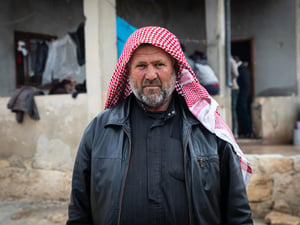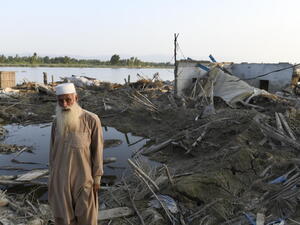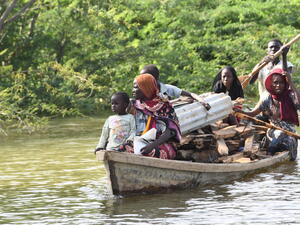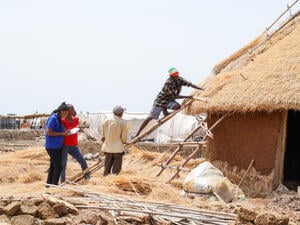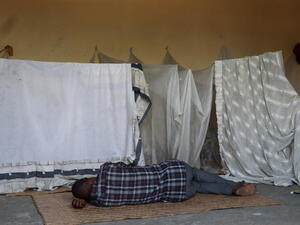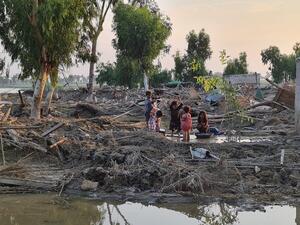Hundreds of Benin flood victims find shelter in UNHCR tents
Hundreds of Benin flood victims find shelter in UNHCR tents
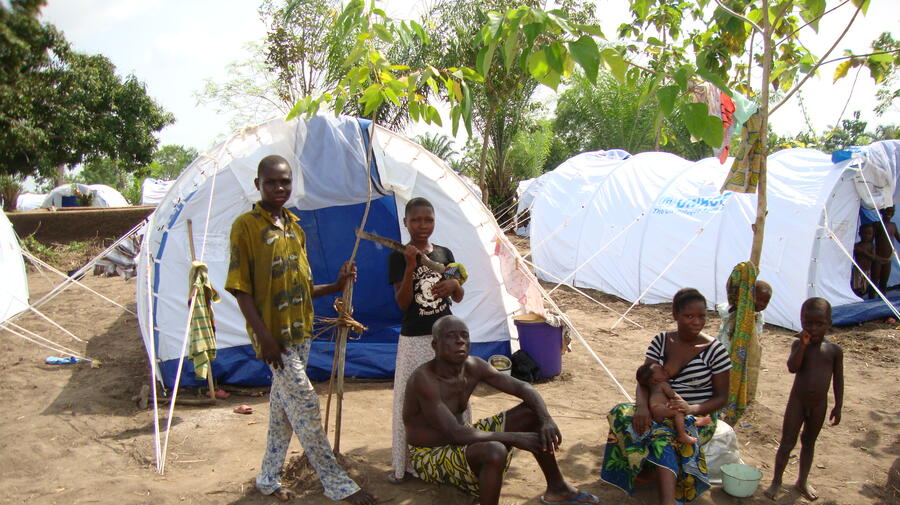
A flood-displaced family outside one of the UNHCR tents delivered to Ouinhi.
OUINHI, Benin, November 5 (UNHCR) - Hundreds of flood victims in the southern Benin town of Ouinhi are living opposite a health clinic and a maternity centre in UNHCR-supplied tents after fleeing their submerged villages.
The Red Cross of Benin has set up 100 UNHCR tents, each of which are designed to house at least five people, in Ouinhi, which lies 155 kilometres north of Benin's government centre and largest city, Cotonou.
They are being used by the inhabitants of two of the five flood-affected villages in Tohu district and another 130 tents are expected to be sent to Ouinhi. Red Cross volunteer Justin Sonon said about 5,000 people had been affected by the floods in these villages.
The UN refugee agency has airlifted 3,000 tents to the small West African country to help the victims of the devastating floods, which have affected almost 700,000 people, mostly in the south. The most vulnerable people, including those living in the open, are being given priority for the tents. Many of the displaced are women and children aged under five.
The new tent settlement in Ouinhi is located some five kilometres from the town centre on dry land belonging to Abanigan Atchahèssou, who was himself forced to flee the flooded village of Gangban with his family.
His sons built a home from mud and thatch for the family, but Abanigan agreed to let his neighbours and other needy families clear his property and move into the UNHCR tents.
At first, many of the displaced from the Tohu villages had sought shelter in a room at the nearby health clinic. But it was soon full and newcomers had to sleep under mango trees, where they were vulnerable to mosquito bites.
The World Food Programme has distributed food to the displaced, but some of the men have been fishing in the swollen River Oueme for extra protein. Spirals of smoke rise above the tents as their womenfolk cook a meal using freshly chopped firewood.
Marguerite Govi, aged 40, is sharing a tent with her four children and her husband as well as his second wife and their nine children. She was cooking lunch - spaghetti after days of eating maize - when UNHCR visited. "The tents help us a lot and we sleep well in them. We thank God because many other people did not get tents," she said.
The whole family were also from Gangban and Marguerite was mourning the loss of her home and the destruction of food stocks. She worked as a medical assistant in the village, where her tasks included monitoring the weight of babies each month for the maternity centre in Ouinhi.
Her husband cannot work his fields because they are under water, but relatives have helped out with money so that they can buy food. Marguerite's children, meanwhile, can still study because the school at Gangban was not hit by the floods. Margaret hoped that they would be able to return in January to rebuild their homes and their lives.
One of her neighbours, farmer Nadjo Dohanssi, was also delighted to have been given a UNHCR tent to live in. The father of 13 said they could all fit into the temporary home. He also hoped to return to his fields in January.
In another corner of the settlement, Honorine, 12, Claire, 15, and Gisele, 14, were studying English and French texts. They can only do their homework during daylight hours. The girls, echoing others in the settlement, complained abuot the lack of latrines and said they did not have enough food. But Claire said, "We sleep better in the tents and there are no mosquitos inside."
The UN refugee agency's presence in Benin is normally focused on providing protection and assistance to more than 7,000 refugees and asylum-seekers, the majority from neighbouring Togo. The agency has been asked to assist with shelter needs as part of a joint UN emergency response to the floods.
Heavy rains are a seasonal occurrence in West Africa, though this year's downfall in Benin has been considerably higher than normal with 55 of the country's 77 districts experiencing flooding.
By Habibatou Mamadou Gologo in Cotonou, Benin

